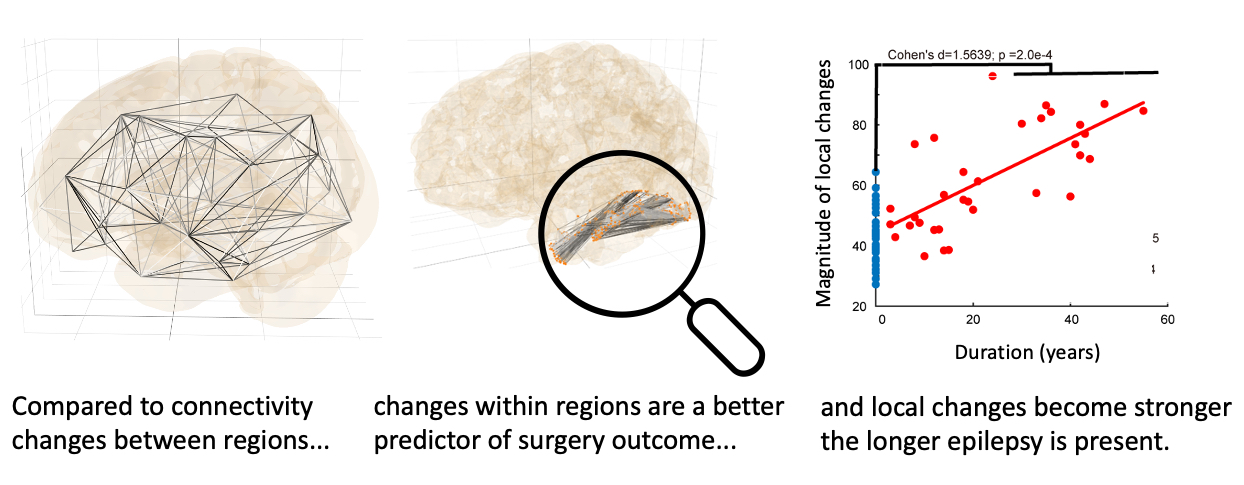Thursday, 20 May 2021
Scientists have discovered that the way in which neurons are connected within regions of the brain, can be a better indicator of disease progression and treatment outcomes for people with brain disorders such as epilepsy.
Many brain diseases lead to cell death and the removal of connections within the brain. In a new study, published in Human Brain Mapping, a group of scientists, led by Dr Marcus Kaiser from the School of Medicine at the University of Nottingham, looked at epilepsy patients undergoing surgery.
They found that changes in the local network within brain regions can be a better predictor of disease progression, and also whether surgery will be successful or not.

The team found that looking at connectivity within regions of the brain, showed superior results to the current approach of only observing fibre tract connectivity between brain regions. Dividing the surface of the brain into 50,000 network nodes of comparable size, each brain region could be studied as a local network with 100-500 nodes. These local networks showed distinct changes compared to a control group not suffering from epileptic seizures.
Using a non-invasive technique called diffusion tensor imaging – a special measurement protocol for Magnetic Resonance Imaging (MRI) scanners – the team of scientists demonstrated that fibres within and between brain regions are removed for patients.
However, they found that connectivity within regions was a better predictor of whether surgical removal of brain tissue was successful in preventing future seizures.
Explaining the work, Dr Kaiser, Professor of Neuroinformatics at the University of Nottingham, says: “When someone has an epileptic seizure, it ‘spreads’ through the brain. We found that local network changes occurred for regions along the main spreading pathways for seizures. Importantly, regions far away from the starting point of the seizure, for example in the opposite brain hemisphere, were involved.
“This indicates that the increased brain activity during seizures leads to changes in a wide range of brain regions. Furthermore, the longer patients suffered, the more regions showed local changes and the more severe were these changes.”
 Dr Kaiser, Professor of Neuroinformatics
Dr Kaiser, Professor of Neuroinformatics
The researchers at Nottingham, Newcastle, Qingdao, Shanghai, and Munich Universities, along with the company Biomax, evaluated the scans of 33 temporal lobe epilepsy patients and 36 control subjects.
Project partners used the NeuroXM™ knowledge management platform to develop a knowledge model for high-resolution connectivity with more than 50,000 cortical nodes and several millions of connections and corresponding automated processing pipelines accessible through Biomax's neuroimaging product NICARA™.
Project manager Dr Markus Butz-Ostendorf from Biomax: “Our software can be easily employed at hospitals and can also be combined with other kinds of data from genetics or from other imaging approaches such as PET, CT, or EEG.”
Commenting on the fact that local changes were more informative of surgery outcome, Professor Yanjiang Wang, who is one of the corresponding authors, and Ms Xue Chen, both from China University of Petroleum (East China), explained: “Local connectivity was not only better in overall predictions but particularly successful in identifying patients where surgery did not lead to any improvement, identifying 95% of such cases compared to 90% when used connectivity between regions”.
The full study can be found here.
Story credits
More information is available from Dr Marcus Kaiser from the School of Medicine at Marcus.kaiser@nottingham.ac.uk
The full paper - Connectivity within regions characterizes epilepsy duration and treatment outcome. Human Brain Mapping, 1– 15. https://doi.org/10.1002/hbm.25464
By Chen, X., Wang, Y., Kopetzky, S. J., Butz‐Ostendorf, M., & Kaiser, M. (2021).
Notes to editors:
About the University of Nottingham
Ranked 97 in the world and 17th in the UK by the QS World University Rankings, the University of Nottingham is a founding member of Russell Group of research-intensive universities. Studying at the University of Nottingham is a life-changing experience, and we pride ourselves on unlocking the potential of our students. We have a pioneering spirit, expressed in the vision of our founder Sir Jesse Boot, which has seen us lead the way in establishing campuses in China and Malaysia - part of a globally connected network of education, research and industrial engagement.
Nottingham was crowned Sports University of the Year by The Times and Sunday Times Good University Guide 2024 – the third time it has been given the honour since 2018 – and by the Daily Mail University Guide 2024.
The university is among the best universities in the UK for the strength of our research, positioned seventh for research power in the UK according to REF 2021. The birthplace of discoveries such as MRI and ibuprofen, our innovations transform lives and tackle global problems such as sustainable food supplies, ending modern slavery, developing greener transport, and reducing reliance on fossil fuels.
The university is a major employer and industry partner - locally and globally - and our graduates are the third most targeted by the UK's top employers, according to The Graduate Market in 2024 report by High Fliers Research.
We lead the Universities for Nottingham initiative, in partnership with Nottingham Trent University, a pioneering collaboration between the city’s two world-class institutions to improve levels of prosperity, opportunity, sustainability, health and wellbeing for residents in the city and region we are proud to call home.
More news…